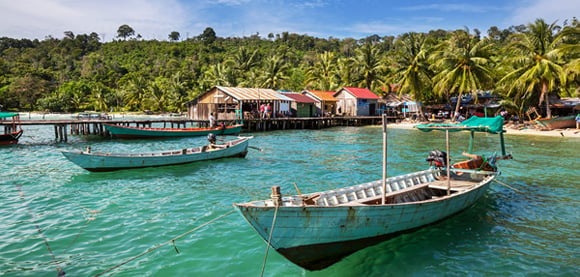Moving to Kampot, Cambodia
Last updated on Jul 10, 2023
Summary: Moving to Kampot, Cambodia: Expats, retirees and digital nomads talk about everything you need to know before moving to Kampot.

What do I need to know before moving to Kampot?
When we asked people what advice they would give someone preparing to move to Kampot, they said:
"Kampot is a small city known for its relaxed atmosphere, colonial architecture, and stunning natural beauty. Before moving there, expats should be aware that the local language is Khmer, although English is widely spoken in tourist areas. It's important to respect local customs and traditions, such as removing your shoes before entering someone's home and dressing modestly. The cost of living in Kampot is relatively low compared to Western countries, but it's still important to budget carefully. The local currency is the Cambodian Riel, but US dollars are also widely accepted. Healthcare facilities in Kampot are basic, so it's recommended to have comprehensive health insurance that covers medical evacuation. The climate in Kampot is tropical, with a rainy season from May to October and a dry season from November to April. It's advisable to prepare for high temperatures and humidity, as well as frequent rain during the wet season. Kampot is famous for its pepper plantations and salt fields, and it's also a great base for exploring the nearby Bokor National Park. However, it's important to be aware of potential safety issues, such as petty crime and road accidents. It's recommended to take precautions, such as not displaying valuable items in public and always wearing a helmet when riding a motorbike. The food in Kampot is a mix of traditional Cambodian cuisine and international dishes, with plenty of fresh seafood and tropical fruits. However, it's advisable to be cautious with street food and tap water to avoid potential health issues. Finally, it's important to have a valid visa to live in Cambodia. The process can be complex and time-consuming, so it's recommended to seek advice from a professional or from other expats who have gone through the process," said one expat in Kampot.
How do I find a place to live in Kampot?
We asked expats how they chose their neighborhood and found a place to live. They answered:
"Finding a place to live in Kampot involves several steps. First, you need to decide on the type of accommodation you want. This could range from a simple room in a guesthouse, a serviced apartment, or a private house. Next, you should research online. Websites like Airbnb, Booking.com, and Agoda can provide a wide range of options for short-term stays. For longer-term rentals, websites like Khmer24 and IPS Cambodia can be useful. Social media can also be a great resource. There are several Facebook groups such as "Expats in Kampot" or "Kampot Noticeboard" where people often post about available rentals. Another option is to hire a local real estate agent. They can help you navigate the local market, negotiate prices, and handle paperwork. Once you've found some potential options, you should visit the places in person. This will give you a chance to check the condition of the property, the neighborhood, and proximity to amenities like shops, restaurants, and transportation. When you've decided on a place, you'll need to negotiate the terms of the lease, including the rent, deposit, and any other conditions. Make sure to get everything in writing. Finally, before moving in, it's a good idea to take photos of the property to document its condition. This can help avoid any disputes when you move out. Remember, finding a place to live in a foreign country can take time and patience, so it's a good idea to start your search well before you plan to move," said one expat who made the move to Kampot.
What is a typical expat home or apartment like in Kampot?
"A typical expat home or apartment in Kampot, is often a blend of traditional Khmer architecture and modern Western conveniences. These homes are usually spacious, with open floor plans and high ceilings to help with the tropical heat. They often have large windows and balconies to allow for natural light and air circulation. The living areas are usually furnished with comfortable sofas and chairs, a dining table, and a television. The kitchen is typically equipped with modern appliances, including a refrigerator, stove, and sometimes a dishwasher. Bedrooms are usually air-conditioned and come with a bed, wardrobe, and sometimes an en-suite bathroom. Many expat homes also have a garden or a yard, providing a space for outdoor activities. Some even have a swimming pool. The homes are often located in safe, quiet neighborhoods, close to local markets, restaurants, and other amenities," remarked one expat who made the move to Kampot.
What is the average cost of housing in Kampot?
If you are thinking about moving to Kampot, cost of living in probably a key consideration. Expats commented about the cost of housing:
"The average cost of housing in Kampot can vary greatly depending on the type and location of the property. For a one-bedroom apartment in the city center, the monthly rent can be quite affordable. However, for larger properties or those located in more desirable areas, the cost can be significantly higher. It's also possible to purchase property in Kampot, with prices again varying widely based on factors such as size, location, and the condition of the property. Overall, compared to many Western countries, the cost of housing in Kampot is generally considered to be relatively low," explained one expat living in Kampot, Cambodia.
Should I buy or rent a home in Kampot?
If you have not spent a lot of time in Kampot, you should rent before even thinking about buying. We asked expats there about the buy vs. rent decision:
"The decision to buy or rent a home in Kampot, largely depends on your personal circumstances, financial situation, and long-term plans. If you plan to stay in Kampot for a long time, buying a home could be a good investment. Owning a property allows you to build equity and provides a sense of stability and permanence. However, buying a home also comes with significant upfront costs, including the down payment and closing costs. You'll also be responsible for ongoing costs like property taxes, maintenance, and repairs. If you're not ready for these financial commitments, or if you're unsure about your long-term plans, renting might be a better option. Renting a home in Kampot offers more flexibility. It's a good option if you're planning to stay for a short period or if you're still exploring different areas in Cambodia where you might want to settle. Renting doesn't require a large upfront investment, and you won't be responsible for maintenance or repair costs. However, renting doesn't allow you to build equity, and you might face rent increases over time. You'll also have less control over your living space, as you'll need the landlord's permission to make changes to the property. In conclusion, both buying and renting a home in Kampot have their pros and cons. It's important to carefully consider your financial situation, lifestyle, and long-term plans before making a decision," said one expat who made the move to Kampot.
What cultural faux pas should I try to avoid making in Kampot?
We asked people in Kampot if they could share any humorous cultural blunders they commited. For new expats, keep in mind that these incidents are an inevitable part of expat life. Learning to laugh about them is the key!:
"In Kampot, it is considered disrespectful to touch someone's head, as it is regarded as the most sacred part of the body. Avoid showing the soles of your feet towards anyone or any sacred place, as feet are considered the lowest and dirtiest part of the body. It's also considered rude to point with your feet. Public displays of affection are generally frowned upon, especially between men and women. It's best to keep such displays private. When visiting temples or other religious sites, dress modestly. Women should cover their shoulders and knees, and men should avoid wearing shorts. Avoid raising your voice or showing anger in public. Cambodians value maintaining harmony and face, so it's important to remain calm and polite, even in difficult situations. It's considered impolite to pass anything with your left hand, as it is traditionally seen as the 'dirty' hand. Always use your right hand or both hands when giving or receiving something. Do not take photographs of people without their permission, especially monks and older people. It's seen as an invasion of privacy. Avoid discussing politics and the country's past, particularly the Khmer Rouge period, as these topics can be sensitive. Lastly, be respectful of the local culture and traditions. Cambodians are generally very welcoming and friendly, but it's important to show respect and understanding of their customs and way of life," remarked one expat who made the move to Kampot.
About the Author
 Joshua Wood, LPC joined Expat Exchange in 2000 and serves as one of its Co-Presidents. He is also one of the Founders of Digital Nomad Exchange. Prior to Expat Exchange, Joshua worked for NBC Cable (MSNBC and CNBC
Primetime). Joshua has a BA from Syracuse and a Master's in Clinical and Counseling Psychology from Fairleigh Dickinson University. Mr. Wood is also a licensed counselor and psychotherapist.
Joshua Wood, LPC joined Expat Exchange in 2000 and serves as one of its Co-Presidents. He is also one of the Founders of Digital Nomad Exchange. Prior to Expat Exchange, Joshua worked for NBC Cable (MSNBC and CNBC
Primetime). Joshua has a BA from Syracuse and a Master's in Clinical and Counseling Psychology from Fairleigh Dickinson University. Mr. Wood is also a licensed counselor and psychotherapist.
Some of Joshua's articles include Pros and Cons of Living in Portugal, 10 Best Places to Live in Ireland and Pros and Cons of Living in Uruguay. Connect with Joshua on LinkedIn.
Other Questions:
- What should I pack when moving to Kampot?
- Where should I setup a bank account in Kampot?
- Will I be able to find a job in Kampot?
- What is life like as an expat in your area?
- What do expats in Kampot appreciate most about the local culture?
- What do expats find most challenging?
- Is there a lot of crime in Kampot?
- Is there a lot of diversity? Are people in Kampot accepting of differences?
- What are the schools in Kampot like?
- How are healthcare services in Kampot?
- What are medical services in Kampot like?
- Are healthcare and health insurance expensive in Kampot?
- What are emergency services like in Kampot?
- Will I need to travel to see a specialist?
- Are common prescription medications available in Kampot?
- How are local medical facilities in Kampot?
- As a foreigner living in Kampot, will I have access to public healthcare? What is it like?
- What have your experiences during the pandemic with the local healthcare system been like?

 Kampot, Cambodia
Kampot, Cambodia


